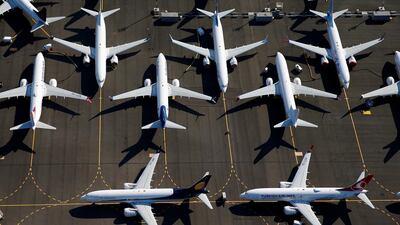A call by Europe's aviation regulator to fix potentially dangerous wiring on Boeing's grounded 737 Max, which the US deems unnecessary, is creating friction between the regulators that could complicate the jet's return to service.
Technical experts at the European Union Aviation Safety Agency (EASA) want certain electrical wires in the plane moved to reduce dangers from potential short circuits, which in a worst-case scenario could disrupt flight-control systems, the Wall Street Journal reported, citing people familiar with the details.
Engineers at Boeing and at the US Federal Aviation Administration (FAA) say relocating the wiring is unnecessary, according to the WSJ report.
The US plane maker has not yet submitted its formal recommendation and FAA chief Steve Dickson is expected to make a decision in the next few weeks, the newspaper reported.
The disagreement between US and European regulators on the wiring issue has prompted the FAA to hold off scheduling a key certification flight for the troubled 737 Max, the report adds.
The disagreement highlights a new set of technical challenges and delays facing the US plane maker as it works to get its best-selling plane back into service worldwide. The 737 Max has been grounded since March after two deadly crashes in the span of five months killed 346 people.
Boeing earlier said it expected the plane to return to commercial service by the middle of this year.
The head of UAE's General Civil Aviation Authority last week said he was “not very optimistic” about the plane resuming flights by mid-2020 and highlighted the burden on Flydubai, the country's sole Max operator, as a result of the grounding of its Max fleet.
On Saturday, the FAA said Boeing recently informed the agency "about concerns associated with the location of wiring in certain areas of the Max." Since then, "the FAA has closely monitored the company's analysis and how the issue might affect the ongoing certification efforts."
The FAA reiterated the Max will be approved to carry passengers again “only after our safety experts are fully satisfied that all safety-related issues are addressed".
A Boeing spokesman said the company is co-operating with international regulators on a thorough certification process, “and we are working to perform the appropriate analysis".
“It would be premature to speculate as to whether this analysis will lead to any design changes," he said.
A spokeswoman for EASA, which also has not submitted its final position to the FAA, declined to comment to the WSJ.

